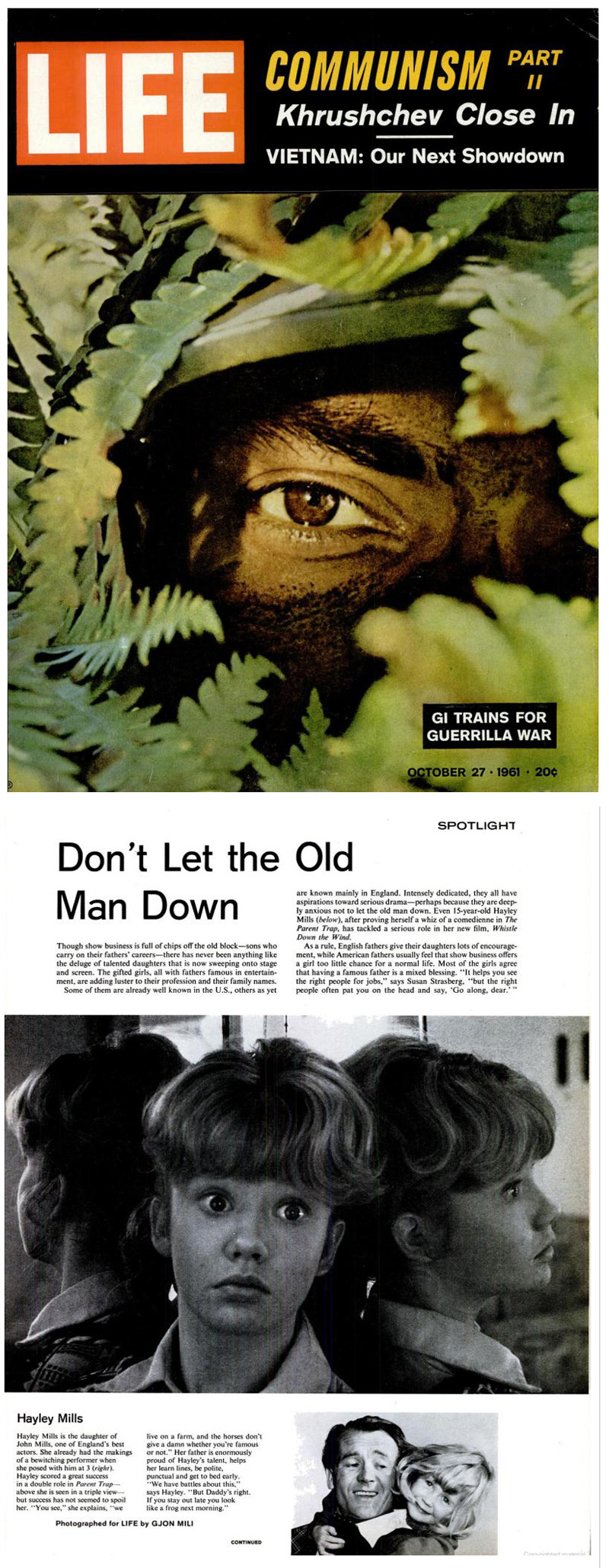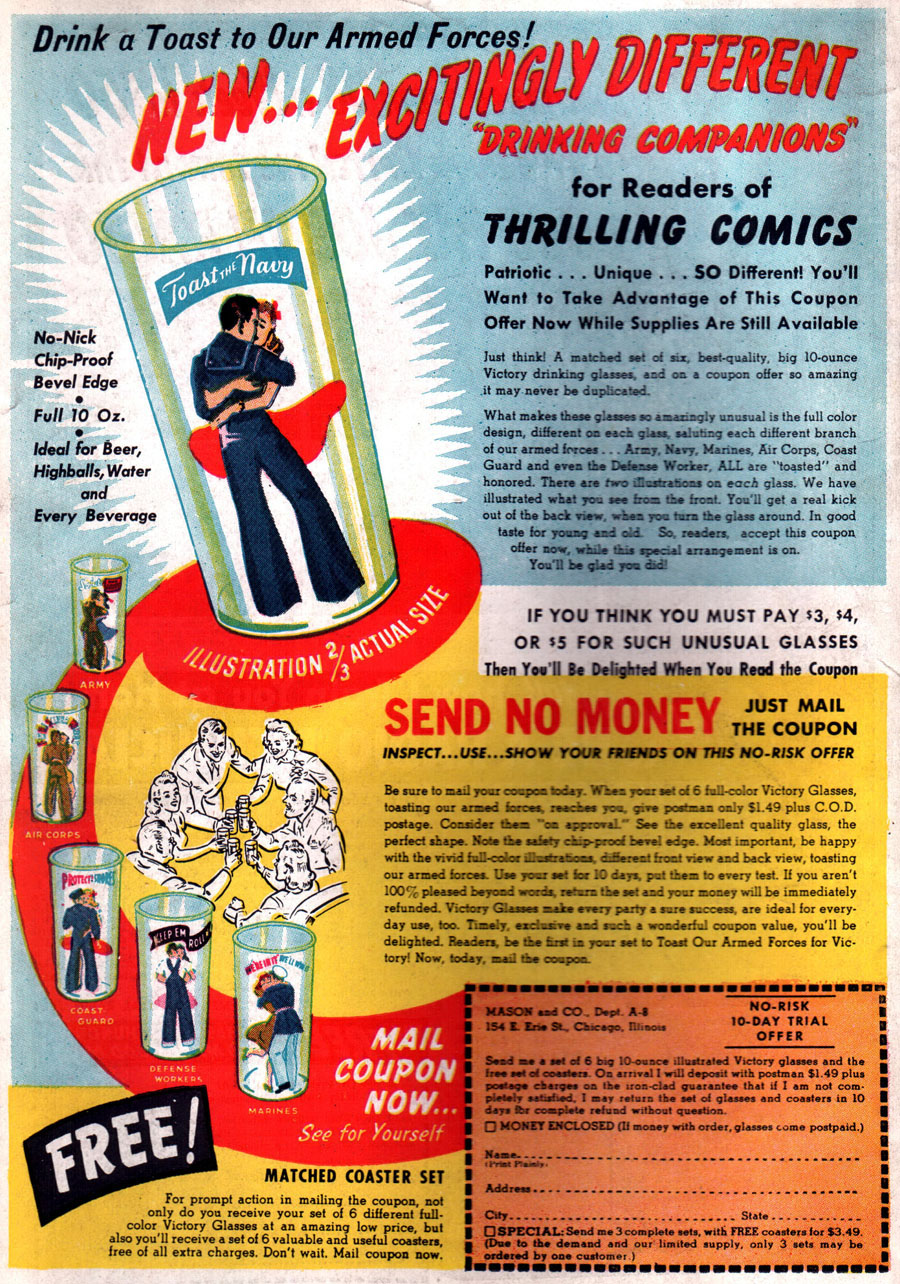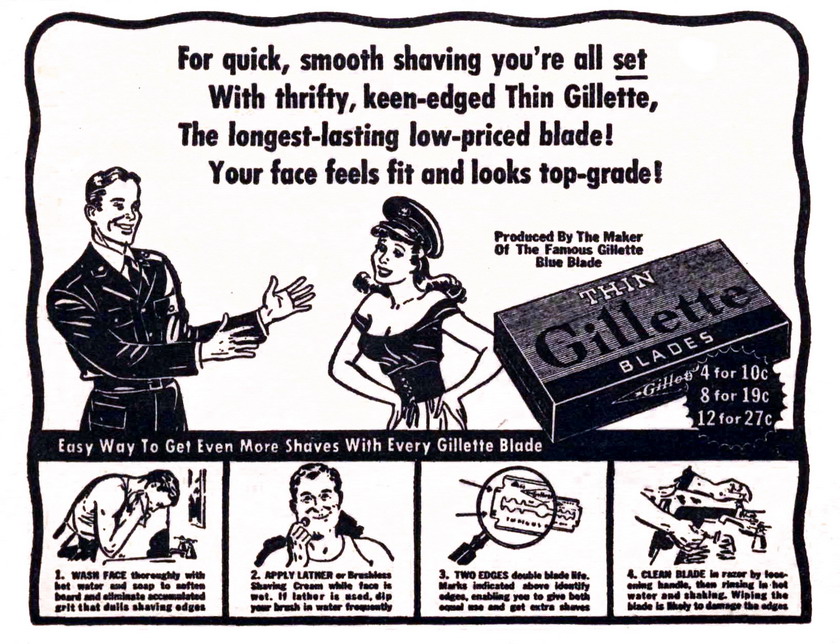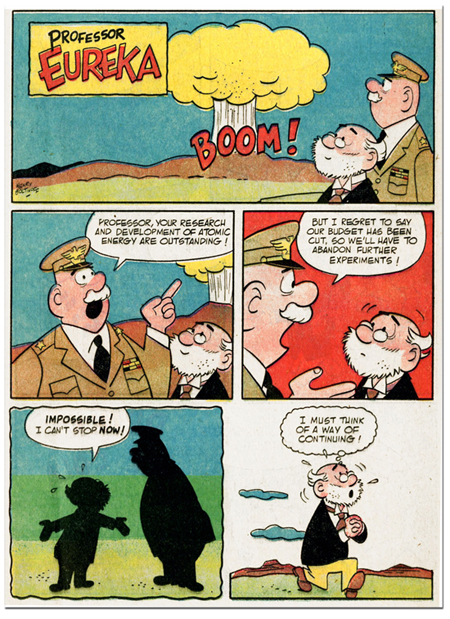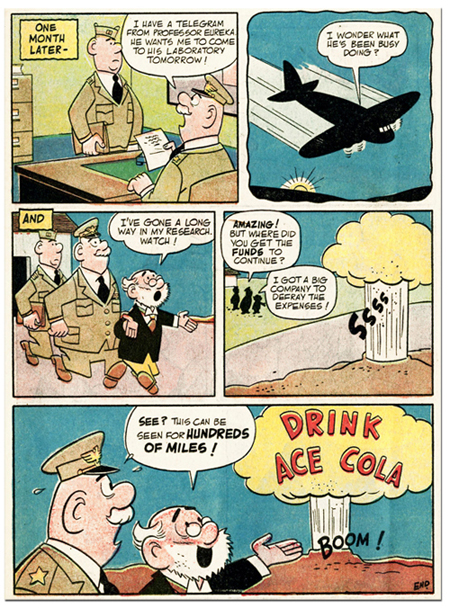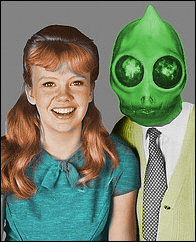Wednesday, December 18, 2013
Christmas: Day 18
Posted by
Sleestak
at
12/18/2013 06:00:00 AM
0
comments
![]()
![]()
Labels: abraham lincoln, christmas, Christmas 2013, civil war, propaganda, santa claus, thomas nast
Monday, July 01, 2013
Monday with Hayley Mills: 20 to LIFE
Posted by
Sleestak
at
7/01/2013 06:00:00 AM
0
comments
![]()
![]()
Labels: 1961, communism, gjon mili, Hayley Mills, Monday with Hayley mills, propaganda, vietnam, war
Thursday, May 26, 2011
Mixed message

For a movie about the ruination of the environment, the makers of the 1971 giant monster flick Godzilla Vs. Hedorah certainly threw a lot of garbage into the water.
Posted by
Sleestak
at
5/26/2011 04:57:00 PM
0
comments
![]()
![]()
Labels: environment, propaganda
Sunday, December 26, 2010
Drinking Companions
Posted by
Sleestak
at
12/26/2010 12:11:00 PM
2
comments
![]()
![]()
Labels: advertising, Comic Book Ad, propaganda
Tuesday, January 12, 2010
The Answers To Everyone's Questions
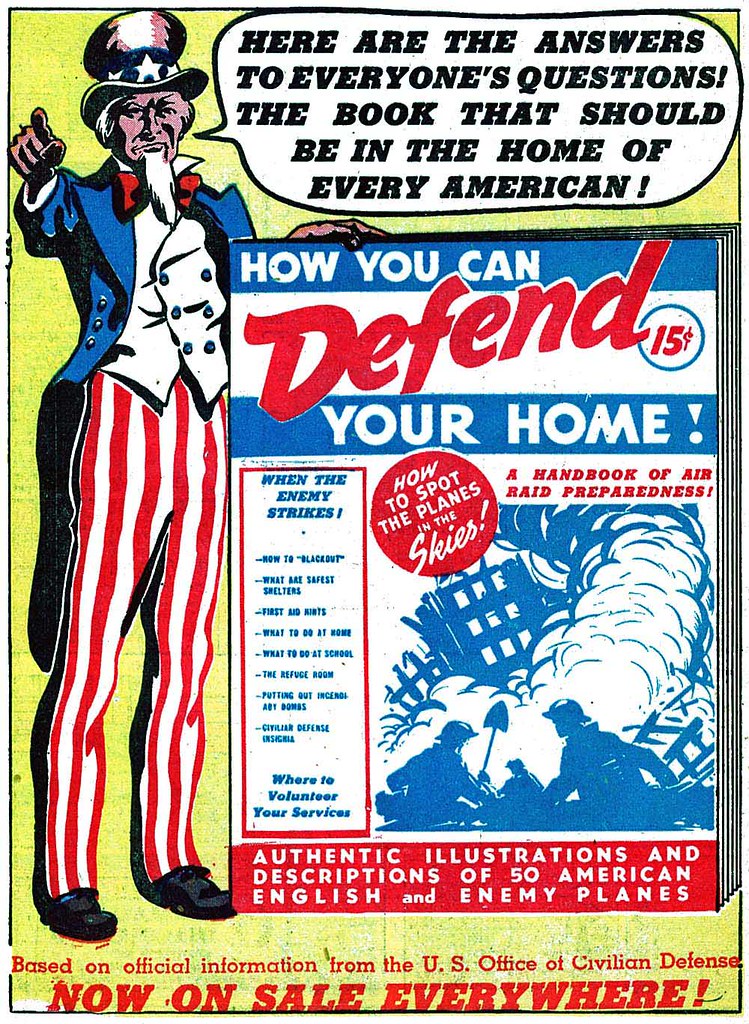 PSA advertisement from All-American Comics #38 (May 1948). It's like some comic book artist saw the future and designed this layout specifically for people in a distant era to screw around with.
PSA advertisement from All-American Comics #38 (May 1948). It's like some comic book artist saw the future and designed this layout specifically for people in a distant era to screw around with.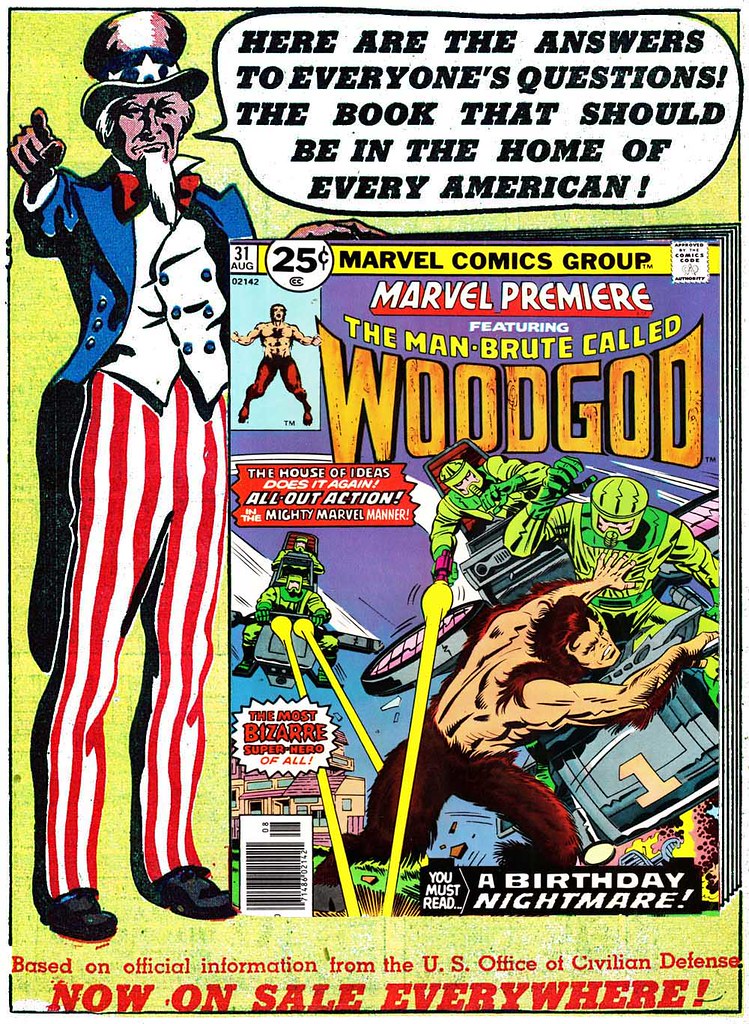 C'mon! Who could hate Woodgod? One of the best things Stan Lee ever did for Marvel was hire hippies.
C'mon! Who could hate Woodgod? One of the best things Stan Lee ever did for Marvel was hire hippies. Boo-yeah!
Boo-yeah! Obvious, but true.
Obvious, but true.
Blank here.
Posted by
Sleestak
at
1/12/2010 12:50:00 PM
2
comments
![]()
![]()
Labels: advertising, Comic Book Ad, fear, propaganda
Wednesday, November 12, 2008
Angela Bomb

Angela Davis from the cover of International Times #132 (May 1972). Artist unknown.
This is a cool graphic from an old UK magazine that I cleaned up a bit to remove the streaks and whatnot though I kept the color scheme. The image is amazingly cool but is a good example how protest art and the subject can be problematic.
Posted by
Sleestak
at
11/12/2008 06:00:00 AM
0
comments
![]()
![]()
Labels: Art, illustration, propaganda, protest, protest art
Tuesday, August 12, 2008
4 out of 5 Drunken European Prostitutes prefer Gillette!
Posted by
Sleestak
at
8/12/2008 09:00:00 AM
2
comments
![]()
![]()
Labels: advertising, Comic Book Ad, propaganda
Saturday, July 19, 2008
PLAN YOUR FUTURE NOW!
Charlton Comics Company, was at best, a poor man's DC Comics. But where DC was content to run a PSA feature urging kids to stay in school so they could retain gainful employment after high school, Charlton went one step further across the border into Wacky Town! Stern, totalitarian authority figures, fear of the Red Menace and the threat of eternal damnation if you slacked off are the themes of this Charlton PSA. Get to work! Remember, the Government is watching you!
Get to work! Remember, the Government is watching you!
Posted by
Sleestak
at
7/19/2008 06:00:00 AM
2
comments
![]()
![]()
Labels: Comic Book PSA, propaganda
Tuesday, April 01, 2008
Helvetica 2:14
 Only the truly devout will receive their just reward of the IBM Selectric II.
Only the truly devout will receive their just reward of the IBM Selectric II.
From Comics on Parade #9 (December 1938).
Posted by
Sleestak
at
4/01/2008 10:06:00 AM
3
comments
![]()
![]()
Labels: Comic Book Ad, propaganda, religion
Monday, March 31, 2008
This is an offical U. S. Treasury advertisement
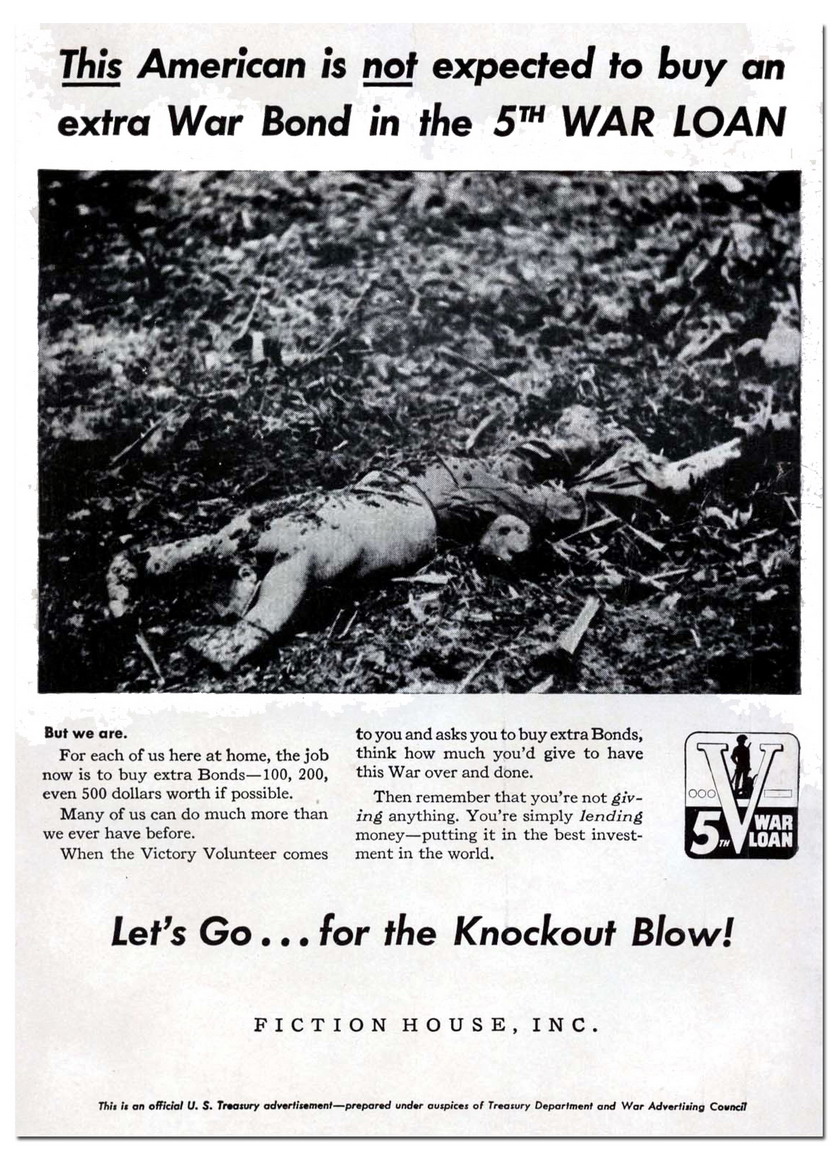 Using shock for monetary gain or to sway public opinion is not a new concept, especially during a time of war. This tasteless ad for War Bonds appeared in the Fiction House pulp magazine Planet Stories #8 (Fall 1944). What is not clear is the identity or occupation of the victim in the ad. Is it a staged warning that Americans could be killed on U.S. soil or is it a photo of a deceased soldier on the battle field? It is open to interpretation, but it is pretty clear that the reader was supposed to assume the latter and that the figure in the field is a soldier who died because they did not support the war effort.
Using shock for monetary gain or to sway public opinion is not a new concept, especially during a time of war. This tasteless ad for War Bonds appeared in the Fiction House pulp magazine Planet Stories #8 (Fall 1944). What is not clear is the identity or occupation of the victim in the ad. Is it a staged warning that Americans could be killed on U.S. soil or is it a photo of a deceased soldier on the battle field? It is open to interpretation, but it is pretty clear that the reader was supposed to assume the latter and that the figure in the field is a soldier who died because they did not support the war effort.
Posted by
Sleestak
at
3/31/2008 06:00:00 AM
2
comments
![]()
![]()
Labels: propaganda
Thursday, October 18, 2007
Second Amendment porn

"...the excitement will erupt full force, and one of life's greatest moments will be upon him. We are witnessing the making of a man."
From Mechanix Illustrated (June 1963).
Posted by
Sleestak
at
10/18/2007 08:15:00 AM
0
comments
![]()
![]()
Labels: advertising, Guns, illustration, propaganda
Saturday, June 16, 2007
Comic Book PSA: Cold War humor from Henry Boltinoff
Gosh! Cutesy cartoons about the nuclear annihilation of mankind are so darn funny! Any child living in the atomic age who read this Professor Eureka page-filler tale from Showcase #12 (January-February 1958) must have been splitting his sides with laughter. This installment of the Prof. Eureka strip is just so Atomic Cafe.
The strip is quite a bit less humorous in contemporary times given the high rate of behind-the-scenes corporate involvement in war and corrupt shenanigans we have in the battle field of today. Not to say it didn't happen in the past, but the American mind-set was a bit different then and the military-industrial complex was the basis of most country's economies. To paraphrase Hank Ford, what was good for war was good for America.
If the professor was a DC Comics villain he'd threaten to bomb a country for ransom, requiring the JLA to step in and halt his mad revenge scheme. But in an all-ages kiddie comic of the 50s he merely struck a marketing deal. Call me cynical, but I sure wouldn't put it past a company to whole-heartedly embrace the notion that they could gain market share through promoting an atomic holocaust. The plot device of the spurned mad scientist seeking revenge against the government or company that failed to recognize their unique genius was often used in popular entertainment, but would not be explored fully and used ad nauseum until the books of the 70s and 80s, when work-for-hire creators took monthly jabs at their employers via their comic book output.
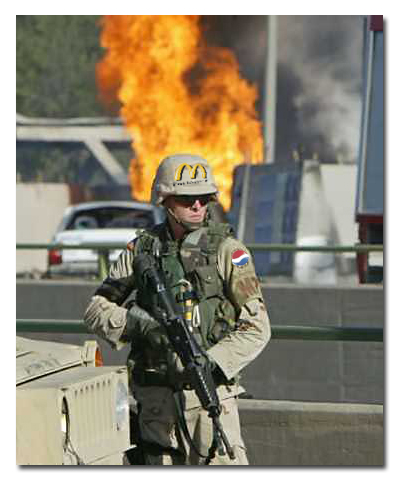 I imagine that even now somewhere there is licensing executive sitting in an office praying for the day their company can put a corporate logo on a weapon of mass destruction similar to the decals on a NASCAR racer or as an advertisement on a soldiers' body armor. It is already in the public consciousness that the bumper-sticker sentiment of "This war brought to you by [insert company name here]" is a truism.
I imagine that even now somewhere there is licensing executive sitting in an office praying for the day their company can put a corporate logo on a weapon of mass destruction similar to the decals on a NASCAR racer or as an advertisement on a soldiers' body armor. It is already in the public consciousness that the bumper-sticker sentiment of "This war brought to you by [insert company name here]" is a truism.Comic books usually follow the public zeitgeist in whatever era they are published. While the creators may have differing ideas and often fight the system from within, the companies themselves are notorious for having editorial policies that fall in line with the prevailing public or official view of things. Golden Age comics of the 1940s were sheer propaganda and little more than an unofficial branch of the War Department due to their desire to reach an audience and stay solvent in a failing pulp and magazine market. The Silver Age of the late 1950s and into the 1960s was all about the wonders of science and the benefits of nuclear energy. That naive sense of Golly-Gee lasted until education about both the Cold and Korean wars made people nervous. The Vietnam conflict was all but ignored in comic books of the late 60s and 70s because the main audience for the books, young adults in college, knew propaganda when they saw it and wanted no part of it. When Vietnam was mentioned at all it was in the context of another war or as a part of a life-changing moment in a character's life when they saw how wrong they were about armed conflict, Tony Stark being one example. For the most part the ultimate American authority symbol of Captain America awkwardly avoided the Vietnam era due in part to the perception that Cap would not be fighting an evil force such as the Nazis or fascism, but instead would be battling women and child-soldiers.
Comics of that era, Marvel particularly, walked a fine line between the liberal consciousness of their audience and the old way of telling a story. It was especially problematic that all of their characters had origins based deeply in the military-industrial complex. While Barry Allen of the Flash comics was a de-facto authority figure in his career as a police scientist, a reader never actually saw him do any actual police work, plus he was a lab-rat so it didn't count that he was a cop. Hal Jordan of Green Lantern was a test pilot and not really an active soldier any longer. While he was part of a space police force, Hal Jordan was often at odds with the way his alien bosses, the Guardians, accomplished their goals. Hal Jordan often got the the job done in his own way by breaking the rules the Guardians had set forth for standards of conduct.
But in the Marvel comics the characters had strong ties to the government and the military, all the things the audience of the 60s and 70s abhorred. So the creators took great pains to make the characters relevant to the readers by making them rebellious authority figures. Bruce Banner created atomic bombs for the military and was thus turned into a Hulk who was then forever at odds with the culture that created him. Tony Stark of the Iron Man series gave up the manufacture of munitions and turned to peaceful efforts, which made him even more powerful and wealthy.
 One thing to remember is that the Professor Eureka strip was written by Henry Boltinoff, who often seems to insert a subtle message into most of his gags, particularly those not only of Prof. Eureka but Peter Puptent as well. I don't know anything about Boltinoff or his politics specifically, but he seems like quite the progressive. In reading his strips I find sexual liberation themes, anti-war and racial equality messages covertly inserted in strips that appear on the surface to be falling in line with the prevailing political and public sentiment of the times but are really the opposite. That he does it without preaching like an After-School Special reveals his cleverness.
One thing to remember is that the Professor Eureka strip was written by Henry Boltinoff, who often seems to insert a subtle message into most of his gags, particularly those not only of Prof. Eureka but Peter Puptent as well. I don't know anything about Boltinoff or his politics specifically, but he seems like quite the progressive. In reading his strips I find sexual liberation themes, anti-war and racial equality messages covertly inserted in strips that appear on the surface to be falling in line with the prevailing political and public sentiment of the times but are really the opposite. That he does it without preaching like an After-School Special reveals his cleverness.Using atomic weaponry as a vehicle for advertising is a powerful image. The corporate-sponsored mushroom cloud is an allegory for Manifest Destiny. The image warns other cultures that they must accept Western influence and embrace Democracy and all that comes with it or else. The stealthy and subtle educational message for readers being that aggressively exporting ideologies can be as destructive as the army of an expansionist tyrant.
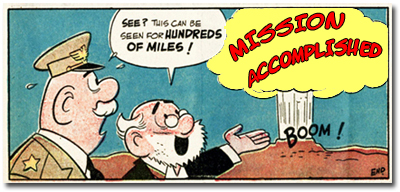 Tags: Henry Boltinoff Propaganda
Tags: Henry Boltinoff Propaganda
Posted by
Sleestak
at
6/16/2007 08:45:00 AM
2
comments
![]()
![]()
Labels: Henry Boltinoff, propaganda


